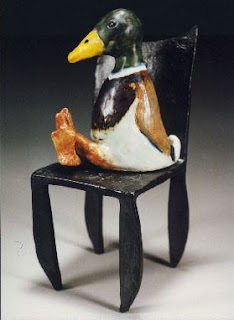 Hey you! Yeah…you. Don’t be a sitting duck. Get off your a$$ and move around. Sitting for too long can get you killed, literally. Several studies suggest that prolonged sitting can cause obesity, heart disease and even death. And let’s not forget hemorrhoids.
Hey you! Yeah…you. Don’t be a sitting duck. Get off your a$$ and move around. Sitting for too long can get you killed, literally. Several studies suggest that prolonged sitting can cause obesity, heart disease and even death. And let’s not forget hemorrhoids.
According to an editorial published in the British Journal of Sports Medicine, physical activity is not enough–sitting too long causes the genes that regulate glucose and fat in the body start to shut down. Whether the sitting is done in a classroom, a car, or in front of the T.V. or computer is inconsequential. What matters is time.
In a Canadian study published last year, 17,000 people were followed for twelve years: Those that sat the most had a higher death risk, independent of whether they exercised or not. Holy hematochezia! That means…aw man, I’m in trouble.
 I’m not the only American needing to worry: A 2003-2004 U.S. survey found that Americans spend more than half their time sitting, from working at their desks to sitting in cars. Although preliminary, these studies point out the dangers of taking too much of a load off.
I’m not the only American needing to worry: A 2003-2004 U.S. survey found that Americans spend more than half their time sitting, from working at their desks to sitting in cars. Although preliminary, these studies point out the dangers of taking too much of a load off.
Well, I must say I’m truly listening to this one. Although I am a highly active person, I also sit a lot. And the results of these preliminary studies make sense to me. The human body is made to move–movement is a part of our very survival. Not in just the obvious way as a means of catching food or escaping predators, but as a way to detect changes in the environment. Our moving parts have receptors–sensory devices that sense the world around us. When these are not used (through movement) regularly, the function of the body is disrupted. Chiropractors know this; we do our part to keep these moving parts moving through adjusting subluxations (stuck joints). But actual movement also need to be carried out. Sitting on your rump is not movement.
So if you want to win the lottery, you’ve gotta buy a ticket. And if you want to get the most out of your movable body, well you figure it out. But may I suggest you not be a sitting duck?













